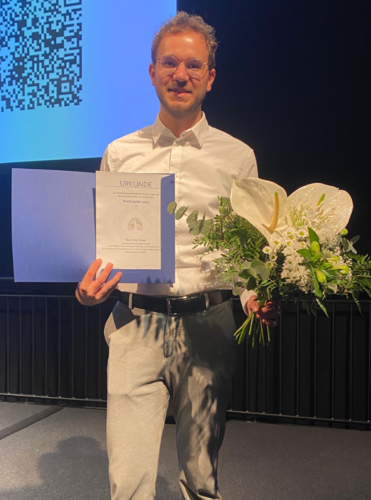This year’s conference of the German Respiratory Society (DGP) took place from 25 - 28 May 2022 in Leipzig. Under the motto “Development and Progress“, experts from the field of pneumology met at the 62nd DGP Conference to learn more about the latest developments and future challenges.
As every year, a jury selected the poster prizes of up to 2,000 EUR from all contributions submitted. Ben Ole Staar, a young scientist at BREATH (Biomedical Research in Endstage and Obstructive Lung Disease), the Hanover site of the German Center for Lung Research (DZL), and a doctoral student in PD Dr. Felix Ringshausen’s working group at the Department of Pulmonary Medicine, has now been awarded one of these coveted prizes. With his contribution on the “Correlation of genotype, phenotype and ultrastructure in adults with clinical suspicion of primary ciliary dyskinesia and inconclusive genetics”, he received third prize at this year’s conference.
The aim of this collaborative work with other BREATH researchers was to improve the diagnosis of primary ciliary dyskinesia (PCD) when the human genetic findings are inconclusive. With molecular genetic exome panel diagnostics, which is of key importance for the accelerated diagnosis of PCD, only in approximately 70% of those affected can an unequivocal result be achieved. By correlating genotype, clinical phenotype and ultrastructure using transmission electron microscopy (TEM), Staar and his fellow researchers wanted to improve this quota. The TEM was thus not only visually evaluated but also analysed using optically averaged images by means of the PCD Detect Software. The group was able to show that, in certain inconclusive human genetic findings, targeted TEM analysis can make the definitive diagnosis of PCD possible. In addition, the use of the PCD Detect Software proved to be helpful.
BREATH and the whole DZL congratulate Ben Ole Staar on his excellent work and wish him and all his colleagues every success in their further research.
Text: BREATH/ AB
Photo: private

Young BREATH scientist Ben Ole Staar